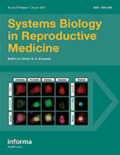
Systems Biology in Reproductive Medicine
Scope & Guideline
Advancing reproductive health through systems biology.
Introduction
Aims and Scopes
- Systems Biology Approaches:
The journal emphasizes the use of systems biology methodologies, including genomics, transcriptomics, and proteomics, to investigate reproductive health and disease mechanisms. - Infertility Research:
A core focus is on the molecular and cellular basis of male and female infertility, exploring genetic, environmental, and lifestyle factors that contribute to reproductive challenges. - Translational Medicine:
The journal aims to translate basic research findings into clinical practices, enhancing diagnostic and therapeutic strategies for reproductive issues. - Innovative Technologies:
The inclusion of cutting-edge technologies such as next-generation sequencing, bioinformatics, and in silico modeling is a hallmark, providing novel insights into reproductive biology. - Interdisciplinary Collaboration:
Fostering collaboration across biological, medical, and computational sciences to address complex reproductive health problems.
Trending and Emerging
- Multi-Omics Approaches:
There is a growing trend towards the integration of multi-omics approaches (genomics, transcriptomics, proteomics) to comprehensively study reproductive health and infertility. - Impact of Environmental Factors:
Increasing research focus on how environmental exposures (like pollutants and lifestyle factors) affect reproductive health at molecular levels. - Immunological Aspects of Reproduction:
Emerging studies on the role of the immune system in reproduction and infertility, highlighting the complex interplay between immune responses and reproductive outcomes. - Microbiome Influences:
A significant rise in research exploring the impact of the microbiome on reproductive health, particularly in semen quality and female reproductive tissues. - Personalized Reproductive Medicine:
A trend towards personalized medicine approaches, utilizing genetic and molecular profiling to tailor infertility treatments and improve outcomes.
Declining or Waning
- Traditional Fertility Treatments:
There has been a noticeable decrease in studies focusing solely on conventional fertility treatments, as the field shifts toward more innovative and personalized approaches. - Basic Histology and Anatomy Studies:
Research concentrating on basic histological or anatomical descriptions without integrating molecular or systems biology perspectives is becoming less frequent. - Single Modality Research:
Papers that focus on single-modality approaches (like only hormone analysis or only imaging techniques) are waning, as multi-omics and integrative methodologies gain preference. - Non-Genetic Factors:
Interest in non-genetic factors affecting fertility, such as purely lifestyle-related studies without molecular insights, appears to be declining. - Aging Studies in Isolation:
Research on aging in reproductive contexts that does not incorporate systems biology perspectives or multi-omics analyses is becoming less prominent.
Similar Journals
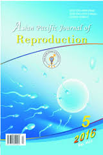
Asian Pacific Journal of Reproduction
Advancing Knowledge Across Species and DisciplinesAsian Pacific Journal of Reproduction is a dynamic open-access journal specializing in a diverse array of topics related to reproduction across various species, including humans, animals, and plants. Published by Wolters Kluwer Medknow Publications, this peer-reviewed journal has been committed to disseminating high-quality research since its inception in 2012. With an accessible ISBN of 2305-0500 and E-ISSN 2305-0519, the journal has rapidly established itself within the academic community, evidenced by its categorization in Q3 and Q4 quartiles across multiple fields, including Obstetrics, Gynecology, and Animal Science. Researchers are encouraged to contribute their findings to foster a deeper understanding of reproductive health and practices in the Asian Pacific region and beyond. The journal's inclusive scope and emphasis on interdisciplinary collaboration make it a crucial platform for professionals and scholars seeking to stay at the forefront of reproductive research.
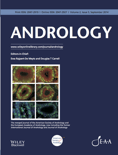
Andrology
Exploring breakthroughs in reproductive health and medicine.Andrology, an esteemed journal published by WILEY, is dedicated to advancing the field of reproductive health and medicine. With an ISSN of 2047-2919, this journal spans critical topics in andrology, urology, and endocrinology, reflecting its strong commitment to scholarly excellence and innovation. As a Q1 ranked journal in both Reproductive Medicine and Urology, Andrology boasts impressive Scopus rankings, standing at 6th in Reproductive Medicine and 8th in Urology, placing it in the top 10% of its field. The journal is accessible as an Open Access platform, ensuring that valuable research findings are available to a broader audience. With significant impact evidenced by its categorization in Q2 for Endocrinology and Diabetes and Metabolism, Andrology serves as an essential resource for researchers, clinicians, and students alike, supporting the continued advancement of knowledge and practice in male reproductive health.

Reproductive Medicine and Biology
Advancing the frontiers of reproductive health.Reproductive Medicine and Biology, an esteemed journal published by WILEY, stands at the forefront of advancements in the field of reproductive health and associated biological sciences. With an impact factor that underscores its relevance—ranking in Q1 for Reproductive Medicine and Q3 in Cell Biology—this journal is distinguished by its commitment to disseminating high-quality, peer-reviewed research since its transition to Open Access in 2002. Based in Japan, the journal caters to a global audience, providing vital insights into reproductive biology, therapeutics, and innovative practices. With Scopus rankings placing it at #22 out of 90 in Reproductive Medicine and a commendable percentile ranking, Reproductive Medicine and Biology aims to foster dialogue and knowledge transfer among researchers, professionals, and students, paving the way for breakthroughs in understanding reproductive health.
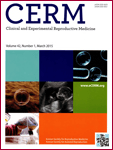
Clinical and Experimental Reproductive Medicine-CERM
Delivering High-Quality Research for a Brighter Reproductive FutureClinical and Experimental Reproductive Medicine (CERM) is a premier journal dedicated to advancing the field of reproductive medicine. Published by the Korean Society of Reproductive Medicine, it aims to disseminate high-quality research and innovative clinical practices in reproductive health and medicine. With its Q3 ranking in reproductive medicine for 2023, CERM is positioned as a significant resource for researchers and practitioners seeking to stay current with the latest developments and findings in the field. Since its inception in 2011, CERM has provided a vital platform for original research articles, review papers, and case studies that cover a range of topics, including fertility treatments, reproductive endocrinology, and embryology. Researchers benefit from its accessibility, inspiring new insights and evidence-based approaches to clinical practices. Based in South Korea, its rigorous peer-reviewed publication process ensures that all contributions meet high academic standards, making it an invaluable asset for anyone engaged in reproductive health research or practice.

Gynakologische Endokrinologie
Advancing Women's Health Through EndocrinologyGynakologische Endokrinologie is a pivotal journal published by SPRINGER HEIDELBERG, dedicated to advancing the fields of endocrinology, obstetrics, gynecology, reproductive medicine, and pediatrics. With an ISSN of 1610-2894, this journal serves as a valuable platform for researchers and practitioners to disseminate their findings and explore emerging trends and treatments in the realm of women's health and endocrine disorders. Though currently positioned in the Q4 quartile across relevant categories, its mission is to foster scholarly discourse that bridges gaps in knowledge and enhances clinical practices. With a commitment to quality research, it provides a forum for innovative studies and case reports that could influence future healthcare strategies. Positioned in Germany, Gynakologische Endokrinologie aims to cater to a global audience, enhancing knowledge and collaboration in critical areas impacting women's health and hormone-related conditions.

Reproductive Biology and Endocrinology
Fostering Innovation in Reproductive and Endocrine ResearchReproductive Biology and Endocrinology, published by BMC, is a distinguished open-access journal established in 2003, catering to researchers and professionals in the interdisciplinary fields of reproductive biology, endocrinology, and related biomedical sciences. With a notable impact in 2023, the journal has achieved Q1 rankings in Obstetrics and Gynecology, Reproductive Medicine, and Endocrinology, alongside a Q2 ranking in Developmental Biology, establishing itself as a pivotal source of high-quality research and insights. The journal's commitment to freely accessible research promotes knowledge dissemination across its domains, which is crucial for advancing understanding of reproductive health and endocrine mechanisms. With a robust Scopus ranking showcasing its relevance—17th out of 209 in Obstetrics and Gynecology, and 8th out of 90 in Reproductive Medicine—it serves as an essential resource for academics and clinicians alike, facilitating innovative research and fostering collaboration within the global scientific community.
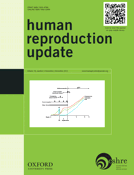
HUMAN REPRODUCTION UPDATE
Transforming Insights into Reproductive MedicineHUMAN REPRODUCTION UPDATE, published by Oxford University Press, stands as a leading journal in the fields of Obstetrics and Gynecology and Reproductive Medicine. With an impressive Q1 ranking in both categories according to the 2023 category quartiles and a significant Scopus rank, it is recognized as one of the top journals globally in these disciplines, catering to the most relevant and cutting-edge research. The journal has been a crucial platform for disseminating vital findings and reviews from 1995 to 2024, contributing to advancements in human reproductive health. With its focus on publishing high-quality, peer-reviewed articles, it serves as an essential resource for researchers, healthcare professionals, and students seeking the latest insights and developments in reproductive science. As the journal aims to foster informed discussions and encourage further research, it remains committed to shaping the future of reproductive health and medicine.

International Journal of Fertility & Sterility
Unlocking New Possibilities in Fertility ScienceThe International Journal of Fertility & Sterility, published by ROYAN Institute, is a leading academic platform dedicated to advancing knowledge in the fields of obstetrics, gynecology, and reproductive medicine. With an ISSN of 2008-076X and an E-ISSN of 2008-0778, this Open Access journal has been making significant contributions to the scientific community since its inception in 2007. Based in Tehran, Iran, the journal showcases rigorous research and promotes interdisciplinary collaboration, addressing critical topics related to fertility, sterility, and reproductive health. As of 2023, it holds an impressive Q2 ranking in Obstetrics and Gynecology and a Q3 ranking in Reproductive Medicine, underscoring its relevance and impact in the academic sphere, with Scopus ranks placing it at #67 in Obstetrics and Gynecology and #32 in Reproductive Medicine. The journal's commitment to accessibility and quality is reflected in its global readership, making it an essential resource for researchers, healthcare professionals, and students seeking to enhance their understanding of fertility issues and reproductive technologies.

SEMINARS IN REPRODUCTIVE MEDICINE
Fostering Collaboration in Reproductive ResearchSEMINARS IN REPRODUCTIVE MEDICINE is a leading peer-reviewed journal dedicated to exploring the complexities of human reproduction, offering insightful perspectives that encompass advances in reproductive endocrinology, obstetrics, and gynecology. Published by THIEME MEDICAL PUBL INC, this esteemed journal holds a notable spot in multiple Scopus categories, ranking 21st in Reproductive Medicine and 38th in Obstetrics and Gynecology, with an impressive impact in the Q1 and Q2 quartiles. With its commitment to high-quality research and clinical implications, the journal serves as a vital resource for practitioners, researchers, and students alike, fostering an environment of innovation and collaboration in the rapidly evolving reproductive health landscape. SEMINARS IN REPRODUCTIVE MEDICINE also offers convenient open access options, ensuring that its contributions are readily available to the global academic community. For over two decades, from its establishment in 1999 to the present, it has retained a pivotal role in disseminating critical findings that inform both clinical practice and future research efforts.
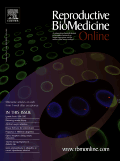
REPRODUCTIVE BIOMEDICINE ONLINE
Exploring the frontiers of reproductive biology and medicine.Reproductive Biomedicine Online, published by Elsevier, is a leading peer-reviewed journal that has established itself as a pivotal resource in the fields of Developmental Biology, Obstetrics and Gynecology, and Reproductive Medicine. With an impressive Impact Factor and a Q1 ranking in its respective disciplines as of 2023, this journal provides a platform for innovative research and comprehensive reviews that contribute to advancements in reproductive healthcare. The journal boasts rigorous Scopus rankings, placing it within the top tiers of its categories, which underscores its significance in shaping contemporary biomedical inquiry. Although not open access, it remains widely accessible through institutional subscriptions, making its wealth of knowledge available to researchers, clinicians, and students alike. Since its inception in 2000, Reproductive Biomedicine Online has been committed to fostering a deeper understanding of reproductive processes and biomedicine, ensuring that its content remains relevant and impactful in addressing challenges in reproductive health, thereby championing exceptional scientific discourse.